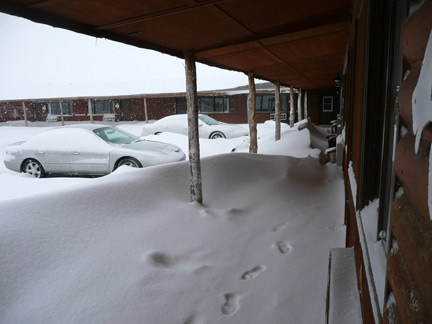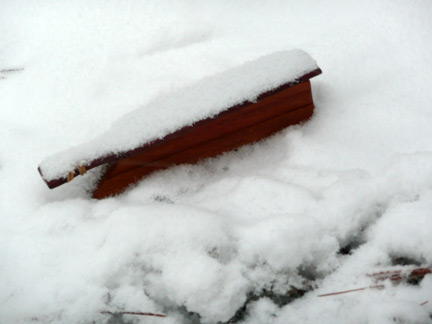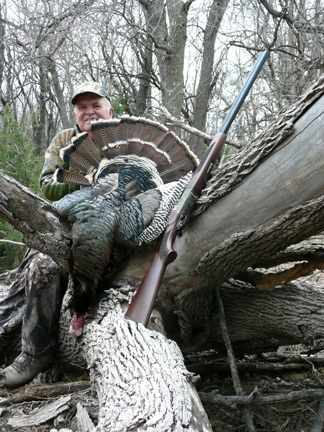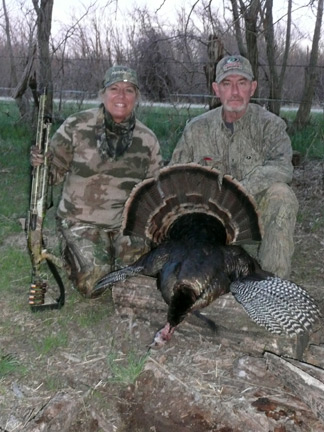May 2013 Newsletter
Click here to view this newsletter in a .pdf with a white background for easy printing.
To make matters even worse, I doubled down on misery the following week on a trip to Water Valley Lodge in the Black Belt region of Alabama. It was a grand trip which combined preserve quail hunting (and fishing for some writers, although I opted to stick to the hunting side of things), but a misty, grey late March morning turned to misery for me when, after watching a gobbler fly from the roost and march all the way across a long, narrow food plot to within easy range, I proceeded to miss. This happened for the usual reason, at least with me (and I think most turkey hunters). In the heat of the moment and amidst great excitement, I failed to get my wooden head down on the stock. As a result, I shot over the turkey’s head. Mind you, I’ve missed before and will miss again, but that doesn’t make it any more palatable (incidentally, anyone who says he has never missed a turkey either hadn’t shot at a lot of them or else is a stranger to the truth). Things got better (not that they could have gotten much worse) once I was back home and opened the season on April 1 hunting the small piece of ground I own here in South Carolina. I killed a two-year-old on opening day and another one two days later. Both birds came to the call without making a sound, and that apparently was the experience of a lot of other hunters in the South. Not much gobbling, except on the roost, and birds henned up in a major way. From my personal observations, the ebb and flow of the mating season, along with the arrival of spring, was at least three weeks behind normal.
(Photo caption: The scene outside the motel in Kyle, SD during the Pine Ridge Reservation hunt.) Thanks to the determination of our outfitter, Lance Christensen, and the fact that he had a truck equipped with chains which let him drive otherwise impassable roads, Earl and I did manage to hunt, albeit circumscribed geographically in a major way, for the next three days. Earl took three gobblers and I managed two, one of which I killed after a sneak through snow that, at one point, found me plunging into a drift belly button deep and beyond.
(Photo caption: Earl Groves’ box call just after I shot the snow storm gobbler.) Although I hunted three or four times on my own property in South Carolina, never hearing a single gobble even though I knew there were birds in the area, one final “big” trip of the year lay ahead. This was a truly special outing arranged by Linda Powell, who handles public relations for Mossberg after having done the same for Remington for many years. She styled the outing as a “mentor” trip, saying it was designed as a way to tender appreciation to four guys who had been mentors to her during her remarkable advance from a woman with no hunting experience to one of the industry’s most respected professionals (and a hard-core, highly capable hunter with experiences on several continents and involving species most of which most of us can only dream). I was honored to be styled a mentor and to join veteran sporting scribes Nick Sisley, Jim Zumbo, and John Phillips.
(Photo caption: The author with one of the two Rios killed on Oklahoma-Texas hunt.) Predictably, given that situation, the birds were still in large groups. In fact, each of the gobblers I killed was mixed up with a vast array of hens, other gobblers, and jakes. The same was true for the longbeard I watched Linda kill. I can say that I was able to call birds to the gun, but it was aggressive hens responding to mocking calls from me, as opposed to lone, lovesick gobblers. I got shots only because the gobblers tagged along with the hens which answered my wingbone yelping (in one case, I did so much of it, and the hen got so worked up, I was gasping for air just to keep up). Adverse weather and flocked up birds notwithstanding, it was the epitome of what one envisions when thinking of a hunt camp setting. Great company, tales aplenty to be shared, food from Ed and his wife, Ellen, fit for a king (or to fatten up hungry hunters), and lots of turkeys even though tagged birds were tough to come by. I ended the season with seven toms and would have taken a Grand Slam had it not been for the dismal situation in Florida. Flying home, my thoughts somehow focused on Linda Powell. The outdoor industry in general, and hunting in particular, is a largely male preserve. I can count on two hands (and have some fingers left over) the women whom I’ve known and hunted with over the years in the wonderful world of the outdoors I considered truly knowledgeable, dedicated professionals. I’m not about to start naming names, although one of the individuals who comes to mind is my long deceased maternal grandmother. She was, in the apt words of her husband, “a squirrel hunting fool.” However, I will state, in all frankness and with every likelihood of someone being ticked off at me as a result (I’ve reached the point in life where I’ve got thick enough skin and the mindset to go with it that I don’t really care) that some of the female TV personalities and high-profile ladies aren’t anywhere near what I consider the “real deal.”
(Photo caption: Linda Powell and Ed Wesner with her Rio.) Bears are her abiding passion, thanks at least in part to the fact her first big-game hunt was a successful black bear outing, but she has whitetails, turkeys, African game, upland game birds, and much more under her belt. I’ve seen her progress from someone who knew next to nothing about guns to a first-rate shot and, more to the point, a savvy hunter. You’ll search long and hard to find anyone who can keep perfectly still for a longer period of time, who can tough it out in adverse conditions (I’ve twice been in turkey set-ups with her where saner souls, rather than shivering in abject misery, would have been hovering around a cheery fire, and once crunched through snow with her on Kodiak Island), and who has incredible patience when it comes to selecting the proper moment to execute the shot. In fact, on the recent trip with Double E Outfitters, she waited for the optimum moment for a shot at a gobbler we had watched for at least 30 minutes. She did once whisper “Do you think he’s too far?” and I answered “Yes.” The fact remains though, had I been alone and in the same situation, I’m not at all certain I could have kept my finger away from the mighty temptation of the trigger for as long as she did. That’s typical of her approach, as was another occasion years ago, never mind it was the last hour of the last day, when she decided to pass on a jake (with a beard of about 6 inches) I likely would have shot. She’s done the same on good but not great bears. Linda shoots straight, handles the duties of her job with a degree of competence almost anyone in the PR business would be well advised to emulate, and is on top of all that a joy to be around. She is, with a gun and as a person, genuinely a “straight shooter.” That’s about enough on the nature of my April other than to note that I found and gathered two mighty fine pickin’s of morels and have noticed that we have a passin’ heavy blackberry bloom this spring. We’ve also been experiencing blackberry winter the last few days, with unseasonably cold weather along with enough rain to evoke thoughts of ark construction. I hope to see those of you who live in the WNC/E. TN region at the upcoming Southeast Conclave of the Federation of Fly Fishers on May 17 and 18 in Cullowhee, NC. I’ll be speaking twice each day and will have a booth, with ample time for talking trout and most anything else which strikes your fancy, at the event. Stop by for a shake and howdy. Next month we’ll return to my standard fare of nostalgia, boyhood joys, and reflections on a life lived close to the good earth. Meanwhile, I’m hoping for enough dry weather to get a garden in, and there’s weeding, mulching, and chores aplenty awaiting me in connection with my blueberry patch, flower beds, rows of thornless blackberries, and more. Once spring arrives and I devote far too many hours to turkey hunting, it seems that running behind is standard operating procedure for me. RECIPES OF THE MONTH All of this month’s recipes come from The Remington Cookbook, one of the two special offers for May. It’s time for grilling, for the sort of fare we associate with cookouts and picnics, and perhaps to start clearing some shelves in the family freezer in anticipation of fall and another hunting season. Mostly though, it’s time to celebrate the culinary experience, something to be done throughout the year. WILD STRAWBERRY TRIFLE Although wild strawberries are the essence of all that is delicious, you can substitute domestic ones (which are in season as this is being written). Cover bottom of a large bowl (or trifle dish) with a layer of crumbled pound cake. Place a layer of whole or sliced (in the case of store bought or “tame” berries) strawberries over the cake, followed by a layer of pudding and a layer of whipped cream. Repeat layers until bowl is full, ending with whipped topping and reserved fresh berries. This is a versatile recipe which also works well with other berries. If you particularly enjoy chocolate, substitute chocolate cake, chocolate pudding, and crushed toffee pieces. TURKEY PIE
6 table spoons butter Melt butter; add flour and seasonings. Cook about a minute stirring constantly. Add broth and half-and-half and cook slowly until thickened. Add turkey and pour into pastry-lined pan. Top with rest of pasty and pinch edges together. Bake at 400 degrees for 30-45 minutes or until pastry is browned. TURKEY SPAGHETTI SAUCE
2 tablespoons olive oil In a large saucepan, heat oil over medium heat. Add onion and cook until soft (about 3 minutes). Add garlic and cook a minute longer. Add turkey and cook until done, about 4 minutes. Add tomatoes, tomato paste, oregano, basil, wine, black pepper and salt. Reduce heat and simmer 1 hour until mixture thickens. Serve over pasta of your choice with freshly grated Parmesan cheese. VENISON CHILI SAUCE FOR VENISON BURGERS OR HOT DOGS
2 tablespoons canola oil Heat oil to medium heat in a large, heavy skillet and sauté onion and garlic until tender. Do not brown. Add venison and cook until meat is browned; stir frequently to break up any chunks of meat. Add remaining ingredients, bring to a boil, reduce heat and simmer until sauce has thickened. You may need to add more or less tomato juice to maintain the correct consistency. Serve over venison burgers with mustard, slaw and onions or as a topping for hot dogs. QUICK VENISON CHILI
1-2 pounds ground or chopped venison Brown venison and onion. Add tomatoes, drained and rinsed beans, tomato paste, water and seasonings. Simmer 45 minutes or longer for flavors to blend. Serve hot, topped with grated cheese and chives and accompanied by crackers. Thank you for subscribing to the
Jim Casada Outdoors
newsletter. |
||||
|
Send mail to
webmaster@jimcasadaoutdoors.com with
questions or comments about this Web site. |

 From
that point forward, weather was a bitter personal enemy. I made a trip
to the fabled hunting of the Pine Ridge Indian Reservation in South
Dakota in company with one of turkey hunting’s true gentlemen and grand
old men of sport, Earl Groves. I arrived in Rapid City, where Earl
picked me up, to howling winds and, well before nightfall, swirling
snow. Earl and I awoke the next morning to blizzard conditions, with
drifts of three to four feet packed against our motel doors (you
literally had to push snow away to get out of the room). Thus matters
stayed for two days, with no chance to get out or even think about
hunting.
From
that point forward, weather was a bitter personal enemy. I made a trip
to the fabled hunting of the Pine Ridge Indian Reservation in South
Dakota in company with one of turkey hunting’s true gentlemen and grand
old men of sport, Earl Groves. I arrived in Rapid City, where Earl
picked me up, to howling winds and, well before nightfall, swirling
snow. Earl and I awoke the next morning to blizzard conditions, with
drifts of three to four feet packed against our motel doors (you
literally had to push snow away to get out of the room). Thus matters
stayed for two days, with no chance to get out or even think about
hunting. From
the Pine Ridge Reservation we drove on to the Devils Tower, Wyoming for
a hunt with Brad Greba of
From
the Pine Ridge Reservation we drove on to the Devils Tower, Wyoming for
a hunt with Brad Greba of
 We
hunted with Ed Wesner of
We
hunted with Ed Wesner of
 On
the other hand, Linda Powell is, and to the nth degree. To me she’s the
perfect example of how sex doesn’t present real barriers, provided the
right mindset and determination exist, to becoming an accomplished
hunter. Similarly, she’s a grand case in point of someone becoming a
dedicated hunter long after having reached adulthood. Over the years
I’ve been privileged to share turkey set-ups, dove fields, hog hunts,
pheasant and quail shoots, deer hunts, and more with Linda, both when
she worked for Remington and in her current post with Mossberg. She is,
both as a highly skilled professional and as a dedicated hunter, what my
Grandpa Joe would have called the “Real McCoy.”
On
the other hand, Linda Powell is, and to the nth degree. To me she’s the
perfect example of how sex doesn’t present real barriers, provided the
right mindset and determination exist, to becoming an accomplished
hunter. Similarly, she’s a grand case in point of someone becoming a
dedicated hunter long after having reached adulthood. Over the years
I’ve been privileged to share turkey set-ups, dove fields, hog hunts,
pheasant and quail shoots, deer hunts, and more with Linda, both when
she worked for Remington and in her current post with Mossberg. She is,
both as a highly skilled professional and as a dedicated hunter, what my
Grandpa Joe would have called the “Real McCoy.”